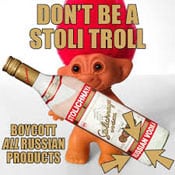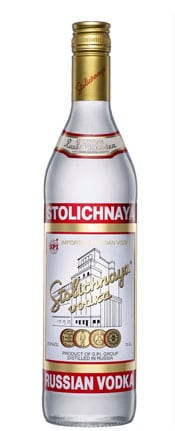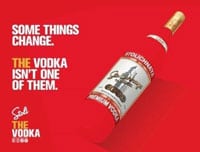It was the summer of 2013 when Russian President Valdimir Putin sponsored the “Anti-Propaganda Law,” which at its core sanctioned violence against the LGBT community in Russia. Stoli Vodka, the largest and most well-known Russian product in the U.S., immediately became the symbol of American outrage again the law.

The backlash was swift. It focused its sites on Stoli. “Dump Stoli” parties were staged at bars across the country. Bloggers and LBGT community leaders went crazy. Journalist and LGBT activist Dan Savage pushed out the message: “Seattle’s bars, gay and straight, must dump Stoli” among others encouraging boycotts. Competitors were quick to take advantage of the situation taking over Stoli shelf space and pushing out anti-Stoli propaganda. During some local events run by “Stoli Guy,” the brand ambassador, boycotts and protests took place making it difficult, if not downright scary, for people to enter the event or even support the event.
“Because we have Russian heritage—it’s on our bottle—we were the target because we stood for Russia,” Maria Lisanti, director of marketing east and control, Stoli Group USA, said at the ANA Multicultural Marketing Conference.
At the same time the Russian crisis hit, Stoli was working to launch the Stoli Group U.S.A. in America—an offshoot of parent SPI Group—to better market the spirit here and trying to ramp up staff.
“We were presented with a huge challenge,” she said. “We became a target of outrage. It was a difficult time for us from a business perspective and trying to get Stoli on its feet in the U.S. We were trying to get a company started and it was damaging information without a lot of the truths being out there.”

What wasn’t clear to the public, however, and those calling for a boycott, was that the grains for Stoli Vodka came from Russia, but that the process was finished and the alcohol was bottled in Latvia. Add to that, in 2010 Putin made it illegal to bulk ship alcohol outside of Russia, so Stoli was no longer a product of Russia, even though the bottles still carried the words “Russian Vodka.”
“There were a lot of misguided stories,” Lisanti said. “We had to think about trying to educate people about the Stoli history and on top of that that our views are very different than what is being experienced in Russia.”
Stoli had to act fast. It was losing relationships, sales and productivity. It went dark. Posting a brief statement on its website: “Stoli stands strong and proud with the global LGBT community against the attitude and actions of the Russian government.” The CEO posted an open letter supporting the LGBT community.
“We didn’t know how to react,” she said. “We kind of just put a Band-Aid on it. We wanted to make sure we said the right thing. We needed subject matter experts.”
Stoli hired Edelman to lean on and guide it through the crisis.
“One thing we learned, lean on the agency that are subject matter specialists. There are so many ways this could have gone,” she said.
The PR team got information out to CNN, the beginning of the education process that would eventually turn things around. In time, the Huffington Post, The Advocate, New York Times, Sirius XM, BuzzFeed and NPR came to Stoli’s aid. A New York Times reporter even traveled to Lativa to validate the production process.
At the same time, the Stoli team hit accounts of bar owners and reached out to distributors one-on-one to get the story straight and held focus groups.
President John Esposito met with The Association of LGBT Journalists and CenterLink, the coalition that supports the development of LGBT community centers. The groups asked for help in terms of resources for its communities and to fight bullying. Stoli pledged $300,000 over the next three years in a partnership with the Los Angeles Gay & Lesbian Center.
Stoli had its playbook back in hand.
“It was critical to keep our lines of communication open with distributors, the sales force, the global team and the media and PR agency,” Listani said. “We addressed all negative comments within six hours and put out written responses within 24 hours.”

Today, the word “Russian” is no longer part of the Stoli label, although it still appears on some shelves due to the large amounts of inventory. It has been replaced with “Stoli The Vodka.” Print ads include the words “All People are Equal. All Vodkas are Not.”
Key Takeaways:
- Write a crisis communication plan—even if you think you don’t need one
- All stakeholders must have an important role and stick to the script
- Listen, but stay hyper focused on the key message
- Activities within any community must be authentic and real



